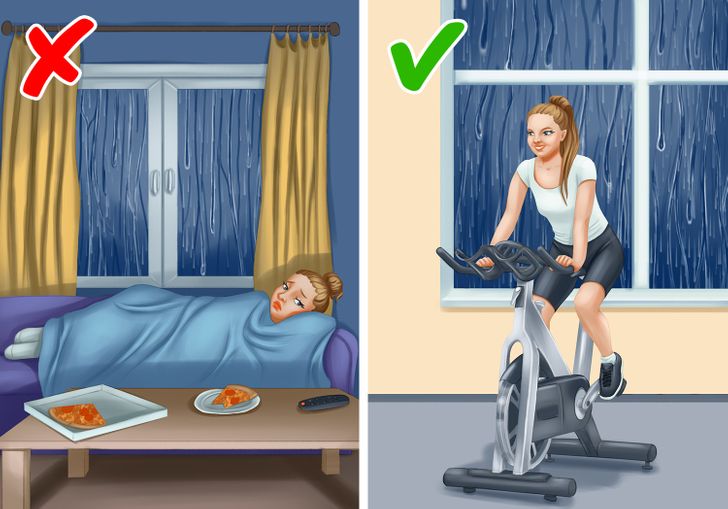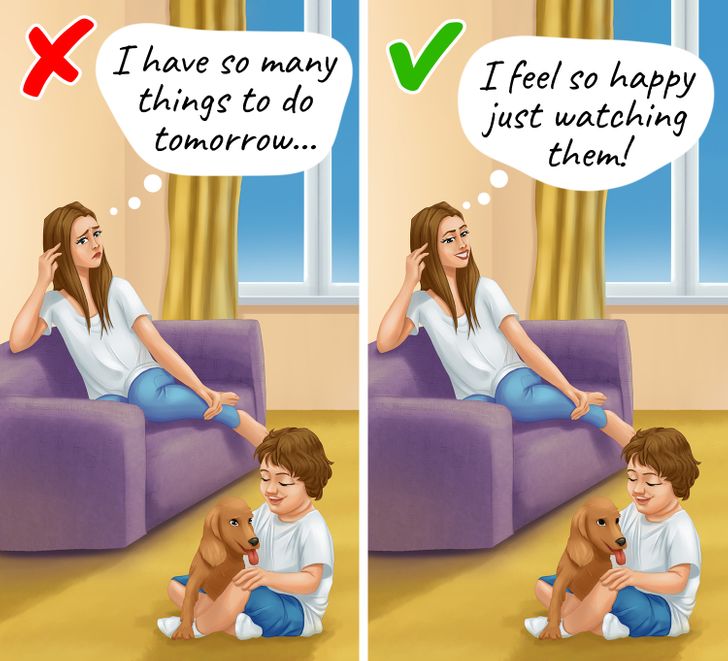What Might Prevent a Person From Being Happy
Subjective feelings of happiness don’t just depend on the events that happen around us, but more on how we interpret them. It also depends on the biochemical processes that occur in our brain, like in the work of hormones and neurotransmitters, that can be controlled.
5-Minute Crafts became interested in what prevents a person from feeling happy, and what actions we can take to fully experience positive emotions, life satisfaction, and happiness more often.
9. A lack of some hormones and neurotransmitters in your body

Feelings of happiness are determined not just by our outlook on life or by the situation in which we find ourselves, but also by the biochemical processes in our body. From a physiological point of view, happiness depends on neurotransmitters like serotonin and dopamine, as well as the hormone — oxytocin, and endorphins.

Serotonin is responsible for feelings of life satisfaction, happiness, and optimism. When you feel depressed, your level of serotonin decreases. In order to activate the production of serotonin, you can do exercise like jog, swim, or walk outside to get fresh air. Eat foods that naturally increase the level of serotonin, like salmon, poultry (chicken, turkey, goose), eggs, spinach, milk, and nuts.

Dopamine is released when we have achieved something. Thanks to the production of this neurotransmitter, we feel pleasure and motivation. In order to activate its production, indulge yourself with tasty and healthy food, and celebrate your achievements, no matter how big or small they are. Take care of yourself, like get a manicure or a haircut, because this also contributes to the production of dopamine.

Oxytocin is responsible for feelings of love and affection, and helps establish social relationships. To activate this hormone, play with children or pets, hug a loved one, or simply compliment someone.

Endorphins suppress pain in the body and can be called natural analgesics. To activate endorphins, exercise, laugh, and indulge in dark chocolate.
8. A lack of sunlight

In fall and winter, people may feel depressed, sad, and drowsy due to a lack of sunlight. This is because shorter daylight hours can increase melatonin production and decrease serotonin production. To correct a low mood due to a lack of light, try to spend more time outdoors during the daytime and exercise regularly.
7. Spending too much time on social media

The Happiness Research Institute conducted an experiment to find out how social media influences the feelings of people’s well-being. Half of the participants in this study didn’t use Facebook for a week, the other half continued to use the social network as usual.
As a result of the experiment, it turned out that those participants who didn’t use Facebook felt happier and more satisfied with their lives. They felt less sad, lonely, and anxious. Researchers also found that people who continued to use social media were 55% more likely to experience stress. And since they compared themselves to other people, they felt less happy.
It’s important to remember that social network users often don’t show reality, but a desired and socially approved image of themselves and their lives. And comparing your life with someone else’s on a social network is dooming yourself to stress and negative emotions.
6. A lack of sleep

Lack of sleep, sleepless nights, and working at night have a negative impact on a person’s well-being, health, and mood, and can lead to depression. According to experts, an adult needs 7 to 9 hours of sleep per day. To make your sleep healthy, follow these recommendations:
- set a specific bedtime
- avoid caffeine in the evening
- dim the lights and put away electronic devices an hour, or more, before going to bed
- exercise in the daytime and also walk in natural light
- use a comfortable mattress, pillow, and bedding
5. Ignoring the good things you have in life

Noticing and expressing gratitude for what you’ve been fortunate to have is a great way to cheer yourself up. A study was conducted, and the participants of which were divided into 3 groups: a “gratitude group” and 2 control groups. The members of the “gratitude group” were asked to write daily thank-you lists for 14 days, listing the things they were grateful for over the course of each day.
The results of the study showed that the members of the “gratitude group” experienced more positive emotions, subjective happiness, and satisfaction with life. At the same time, they showed fewer negative emotions and symptoms of depression.
Thus, in order to feel happy, it’s important to notice the good and joyful things that happen in your life, instead of focusing on the difficulties.
4. Suppressing negative emotions

Repression of negative emotions from your consciousness can be compared to a dam that could break open at any moment. The psyche spends a lot of energy suppressing negative emotions, and this can lead to emotional dysfunction. Emotions that are repressed can manifest themselves as physical symptoms (somatization) — this is how they find another way out.
Therefore, admitting to some of your negative emotions and not ignoring them is normal. If you allow yourself to mourn the breakdown of a relationship, the loss of a beloved pet, or the loss of a job, the pain will go away faster compared to a time where you are hiding from your real emotions in artificial joy and optimism.
3. A lack of self-love and self-support

It’s hard to feel happy if you don’t love and support yourself. Pay attention to how you talk to yourself when you spot a flaw or make a mistake. Are you insulting yourself or speaking in a kind and understanding tone of voice? We often treat ourselves much more harshly than others treat us.
The first step to replacing a harsh inner voice with a kinder one is to simply notice it and then try to soften it.
Take care of yourself as well as of others. Treat yourself the way you would treat your children or your best friend — with tenderness and care.
2. Living in the past or in the future

People feel happier when they live in the present moment. Experts believe that even if the activities we’re engaged in are not really interesting (like being stuck in traffic), we feel happier when we are focused on the present moment than when our thoughts wander elsewhere.
So practice mindfulness and focus on the here and now. Instead of wandering in the past or worrying about the future, try enjoying the simple moments of life and take a pause sometimes to watch the sunset, take a walk, or have a cup of coffee while being fully present in the moment.
1. Inability to be “in the flow”

The Hungarian-American psychologist Mihaly Csikszentmihalyi, known for his research on happiness and creativity, found that people are happiest when they are in a state of flow — a state of concentration or complete absorption with the activity or situation at hand.
When we are “in the flow,” we are so immersed in our activities that everything else ceases to matter: we forget about thirst, hunger, and time, and instead of tiredness we feel energized. There are several ways to achieve a state of flow.
- Set clear goals.
- Eliminate distractions. It’s harder to be in the flow if there are things in your environment that are competing for your attention. The first step is to turn off your smartphone.
- Learn to balance your skills and a task’s complexity. Meaning, the task should not be too simple or too difficult for you.
- Choose what you like: It’s difficult to achieve a state of flow if you’re doing something you don’t like.